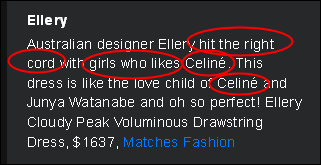Nothing in this photo caption on Yahoo! Style hits the right note or strikes a chord with me:

I’m embarrassed for the writer. She managed to screw up a common expression in two ways: The expression is “hit the right note” or “strike a chord” (but she can’t even use the correct homophone in the latter). It’s followed in the same sentence with a mismatched subject and verb. And to prove that she’s not just grammatically and verbally impaired, she shows that she knows little about the subject of this mess by misspelling Céline. I’ve read high school newspapers that are better written and edited than this.










